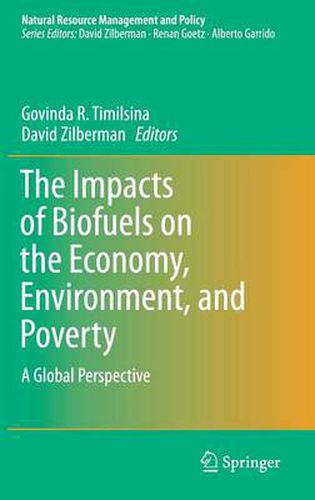Readings Newsletter
Become a Readings Member to make your shopping experience even easier.
Sign in or sign up for free!
You’re not far away from qualifying for FREE standard shipping within Australia
You’ve qualified for FREE standard shipping within Australia
The cart is loading…






This title is printed to order. This book may have been self-published. If so, we cannot guarantee the quality of the content. In the main most books will have gone through the editing process however some may not. We therefore suggest that you be aware of this before ordering this book. If in doubt check either the author or publisher’s details as we are unable to accept any returns unless they are faulty. Please contact us if you have any questions.
Interest in biofuels began with oil shocks in the 1970’s, but the more rapid development and consumption of biofuel industry in recent years has been primarily driven by mandates, subsidies, climate change concerns, emissions targets and energy security. From 2004 to 2006, fuel ethanol grew by 26% and biodiesel grew by 172%. As biofuel production continues to expand, investments in capacity expansion and research and development have been made. The 2008 food crisis emphasized the need to re-examine biofuel consequences. Biofuels remain an important renewable energy resource to substitute for fossil fuels, particularly in the transportation sector, yet biofuels’ success is still uncertain. The future of biofuels in the energy supply mix relies on mitigating potential and improving the environmental gains. This book brings together leading authorities on biofuel from the World Bank to examine all of the impacts of biofuel (economic, social, environmental) within a unified framework and in a global perspective, making it of interest to academics in agricultural and environmental economics as well as industry and policy-makers.
$9.00 standard shipping within Australia
FREE standard shipping within Australia for orders over $100.00
Express & International shipping calculated at checkout
This title is printed to order. This book may have been self-published. If so, we cannot guarantee the quality of the content. In the main most books will have gone through the editing process however some may not. We therefore suggest that you be aware of this before ordering this book. If in doubt check either the author or publisher’s details as we are unable to accept any returns unless they are faulty. Please contact us if you have any questions.
Interest in biofuels began with oil shocks in the 1970’s, but the more rapid development and consumption of biofuel industry in recent years has been primarily driven by mandates, subsidies, climate change concerns, emissions targets and energy security. From 2004 to 2006, fuel ethanol grew by 26% and biodiesel grew by 172%. As biofuel production continues to expand, investments in capacity expansion and research and development have been made. The 2008 food crisis emphasized the need to re-examine biofuel consequences. Biofuels remain an important renewable energy resource to substitute for fossil fuels, particularly in the transportation sector, yet biofuels’ success is still uncertain. The future of biofuels in the energy supply mix relies on mitigating potential and improving the environmental gains. This book brings together leading authorities on biofuel from the World Bank to examine all of the impacts of biofuel (economic, social, environmental) within a unified framework and in a global perspective, making it of interest to academics in agricultural and environmental economics as well as industry and policy-makers.